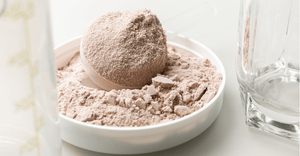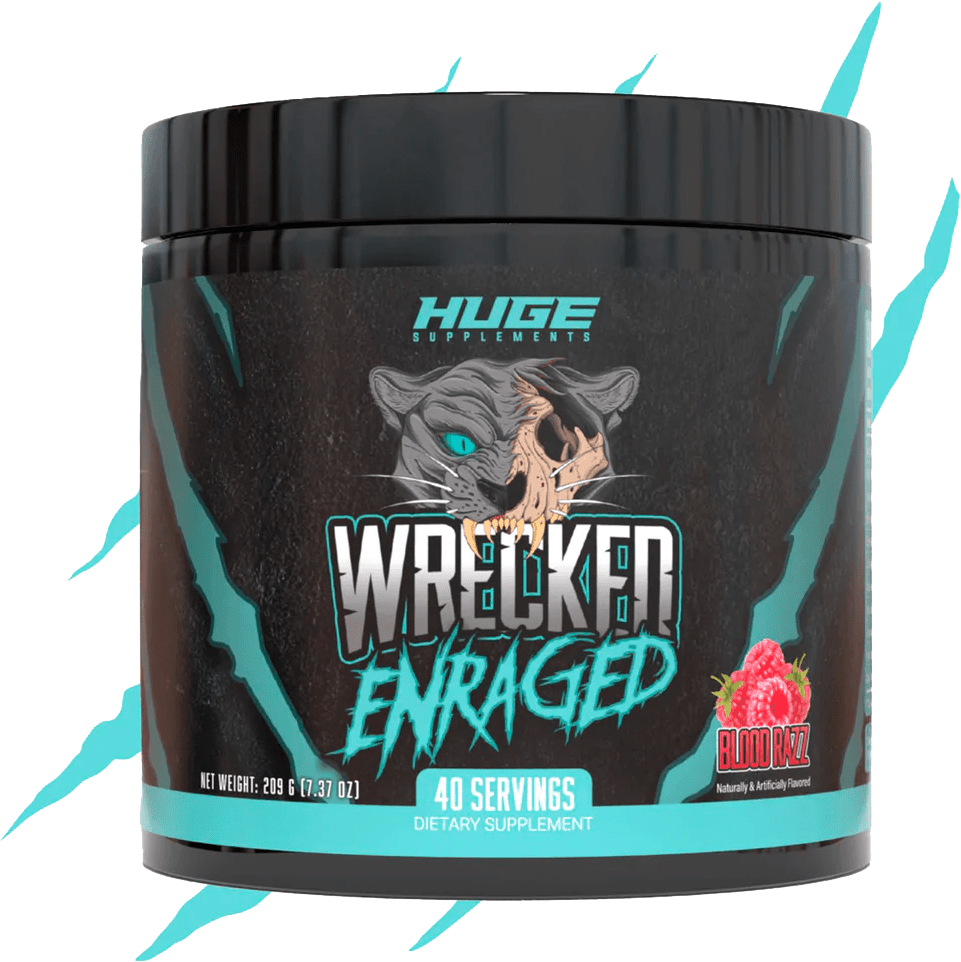Whey Protein VS. Plant Protein: Which Is The Better Choice?
Protein supplements are synonymous with lean muscle gains and bodybuilding. Over the years, protein supplements have become a lot more popular and more effective, largely due to the fact that protein supplements are now more refined and offer much better absorption rates. Yet, the ongoing debate about whether plant or dairy-based proteins are better continues to rage on.
There are pros and cons to both types of protein. Whey proteins are complete, meaning they contain all of the essential amino acids; however, they are unsuitable for lactose-intolerant people. Plant proteins, on the other hand, are not complete proteins but are generally much easier to digest and are suitable for those with lactose intolerance. So, the answer to which is better all depends on you.
In this post, we’ll take a closer look at the ongoing debate over whey and plant-based proteins. We’ll dive into what a protein actually is, explain why both products can help supplement your daily protein requirements, and finally put to rest the question of which is better—plant or whey protein?
What Is Protein?
Put simply, protein is a macronutrient made up of amino acids. Amino acids are the building blocks of protein and are essential for supporting various bodily functions, including muscle growth and repair. There are 20 different amino acids, 9 of which are considered essential, meaning our bodies cannot produce them and we must obtain them through our diet.
Protein can be found in both animal and plant-based foods; however, not all sources of protein are created equal. Animal-based proteins, such as whey and casein, are complete proteins, meaning they contain all 9 of the essential amino acids. Plant-based proteins, on the other hand, are not complete proteins and are missing one or more of the essential amino acids.
This creates a problem for some people, though, as their diets limit the types of foods they can consume. Lactose intolerant people cannot consume whey protein products because they’re sourced from dairy. Likewise, vegans cannot consume whey proteins because they’re technically an animal product.
Therefore, they have to carefully monitor which foods they consume to guarantee they’re getting the right blend of essential and non-essential amino acids.
Why Should I Care About Protein?
Protein is an essential macronutrient that plays a key role in many bodily functions, including muscle growth and repair, immune function, and hormone production. Getting enough protein is essential for anyone looking to improve their health and fitness, including athletes, bodybuilders, and casual gym-goers.
Protein supplements, such as whey protein and plant-based protein powders, can help you meet your daily protein requirements, especially if you have a busy lifestyle or find it difficult to get enough protein from your diet. Think of them as a convenient and easy way to ensure you're getting enough protein to support your health and fitness goals.
Without the right amount of protein, your cells wouldn't be able to grow and repair properly, you'd be more susceptible to illness and infection, and your muscles would waste away. Simply put, protein is essential for good health, and protein supplements can help you meet your daily needs.
How Much Protein Should You Eat Per Day?
The amount of protein you need per day depends on a number of factors, including:
- Your age - Protein requirements change as people age because of changes in muscle mass. As people age, they tend to lose muscle mass, which means they need less protein.
- Activity level - Protein is important for repairing and rebuilding muscles. When you are active, your muscles are constantly breaking down and rebuilding, requiring a constant supply of protein.
- Current muscle mass - The more muscle mass you have, the more protein you need to maintain that muscle mass. Without enough protein, your body will slowly begin breaking down your muscles.
The recommended dietary allowance (RDA) for protein is 0.36 grams per pound (0.8 grams per kilogram) of body weight. For a sedentary person, this amounts to 56 grams of protein per day for a man and 46 grams per day for a woman. However, if you’re active or trying to build muscle, you may need more protein.
The American College of Sports Medicine (ACSM) recommends 1.2 to 2.0 grams of protein per kilogram of body weight for athletes, while the International Society of Sports Nutrition (ISSN) recommends 1.4 to 2.0 grams per kilogram of body weight. To put this into perspective, a 180-pound man would need 65-109 grams of protein per day, while a 120-pound woman would need 64-96 grams per day.
What is Whey Protein?
Whey protein is a complete protein that is derived from milk. It’s a by-product of the cheese-making process and is typically made into a powder that can be mixed with water or milk. Whey protein is a popular choice among athletes and bodybuilders because it’s a fast-acting protein that is easily digested and absorbed by the body.
Whey protein is a rich source of the amino acids leucine, isoleucine, and valine, which are essential for muscle growth and repair. It’s also a rich source of branched-chain amino acids (BCAAs), which can help reduce exercise-induced muscle damage.
There are three main types of whey protein:
- Whey protein concentrate (WPC) – WPC is the most common type of whey protein and typically contains 70-80% protein. The remaining 20-30% is made up of fat, lactose, and minerals.
- Whey protein isolate (WPI) – WPI is a more purified form of whey protein that contains 90-95% protein. The remaining 5-10% is made up of fat, lactose, and minerals.
- Whey protein hydrolysate (WPH) – WPH is the most purified form of whey protein and is sometimes even used by people who are lactose intolerant. It contains 95-99% protein and the remaining 1-5% is made up of fat, lactose, and minerals.
Athletes typically consume whey protein either before or after a workout in the form of a shake. It’s mixed with milk or water to create a smoother texture and powders are often flavored with cocoa powder, vanilla, and other flavorings.
Some brands use artificial additives to improve the texture and flavor of their final product but we don’t recommend taking these. Instead, stick with all-natural whey products, such as Huge Whey, to build clean, lean muscle mass. Huge Whey comes in four delicious flavors—Chocolate Peanut Butter, Vanilla Milkshake, Cookies ; Cream, and Strawberry Cheesecake—and is loaded with 25 grams of protein in every serving.
What is Plant-Based Protein?
Plant-based protein powders are made from a variety of sources, including peas, rice, soy, and hemp. They are a popular choice among vegans, vegetarians, and people with lactose intolerance, however, they are generally not complete proteins. This means they’re missing one or more of the essential amino acids.
To compensate for missing essential amino acids, most plant-based powders combine several ingredients to maximize their protein profiles. For example, one of the most common combinations is a mix of pea and rice proteins. Both of these ingredients contain near-complete profiles but, when added together, they provide all the essential amino acids your body needs.
Soy protein is another common ingredient in plant-based protein powders. Soy protein is a complete protein that is derived from soybeans and is a popular choice among vegetarians and vegans because it contains all 9 of the essential amino acids. However, many people have soy allergies, preventing them from consuming these products.
Nevertheless, plant proteins can still be a valuable source of protein for people who are looking to improve their health and fitness. They are generally easier to digest, contain less fat, and are suitable for those with lactose intolerance. Therefore, they are an excellent choice for anyone looking for an alternative to whey protein.
So, Which is Better—Plant or Whey Protein?
To be honest, the answer to this question depends on you. To help you better understand which product to buy, let’s quickly run through some of the pros and cons of each type of protein. Consider which better suits your needs and buy from there.
Pros and Cons of Whey Protein
Whey protein is one of the most popular and widely used workout supplements for a reason. It’s proven to work and is loved for its creamy texture, delicious flavor, and clear benefits:
- Whey helps build muscle – Whey protein supplements offer a complete protein profile with around 25 grams of protein in every serving. They’re also full of branched-chain amino acids to help you build endurance as you exercise.
- Whey helps burn fat – Whey proteins are harder to digest, keeping you full between meals and helping you hit caloric deficit.
- Whey tastes better – Whey contains dairy fats and sugars, helping it taste sweeter and creating a creamier texture in your mouth.
However, whey isn’t a perfect product. Before you start taking whey protein powders be sure to understand some of its weaknesses:
- Whey can cause bloating – Whey proteins are harder to digest than plant proteins, causing some athletes to experience bloating, gas, and abdominal pain shortly after consuming whey supplements.
- Whey is fattier – If you are trying to lose weight, whey protein might not be the best choice. Many whey products contain saturated dairy fats, which can end up sitting on your waistline.
- Whey contains lactose – If you’re lactose intolerant, whey protein will upset your stomach and cause sudden diarrhea.
At the end of the day, though, whey is a complete protein and, if you take the time to research various products, you can easily find quality supplements like Huge Whey that are low-fat, low-sugar, and packed full of pure protein.
Pros and Cons of Plant-Based Protein
Plant-based proteins might not be as widely used but they’re still a popular choice among athletes for the following reasons:
- Plant proteins are vegan – Bodybuilders might look like they eat a cow a day but there are plenty of vegans who work out too. Just like anyone else, they too need protein to build lean muscle without breaking their diets.
- Plant proteins are lactose-free – Even if you consume meat and animal products, you might not be able to consume dairy. Plant proteins offer a viable solution to anyone who is lactose intolerant.
The only reason plant proteins get a bad rap is because:
- Plant proteins are not complete – Plant-based proteins are missing one or more of the essential amino acids, so they’re not ideal for athletes looking to build muscle.
- Plant proteins don’t always taste great – Plant proteins are often gritty and taste like the vegetables they’re made from.
- Plant proteins can be more expensive – Many plant-based proteins are more expensive because they’re sold as a niche option for unique dietary requirements.
Despite their limitations, you can still find high-quality plant proteins with complete profiles, delicious flavors, and smooth textures. If you’re looking for a premium option, we recommend Huge Vegan.
Frequently Asked Question
Which is absorbed faster, plant protein or whey?
Whey protein—especially hydrolysate protein—is better known for its fast rate of absorption. It’s slightly more processed and, therefore, easier for the body to break down and absorb.
Which is better for fat loss?
Both products can help you burn fat. Any protein will take time to digest, keeping you full longer and fighting off cravings throughout the day.
Which is more expensive, plant-based protein or whey?
Plant-based protein supplements are usually more expensive. They’re marketed as vegan, organic, gluten-free products and, therefore, cost a little more. Whey proteins, on the other hand, are easy to find and cost about 20% less.
Conclusion
If you are looking for a complete protein that is high in the essential amino acids needed for muscle growth and repair, then whey protein is a good choice for you.
However, if you are looking for a protein powder that is easier to digest and is suitable for those with lactose intolerance, then plant-based protein is a good choice for you.












Leave a comment